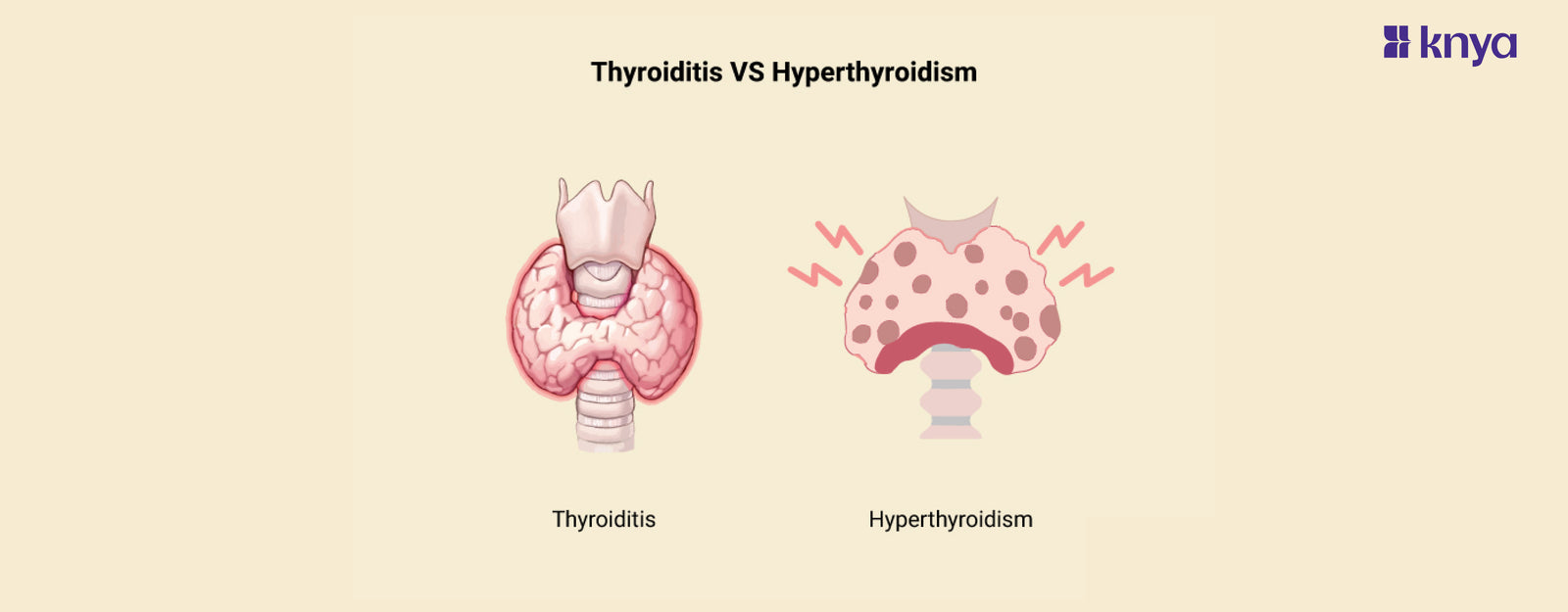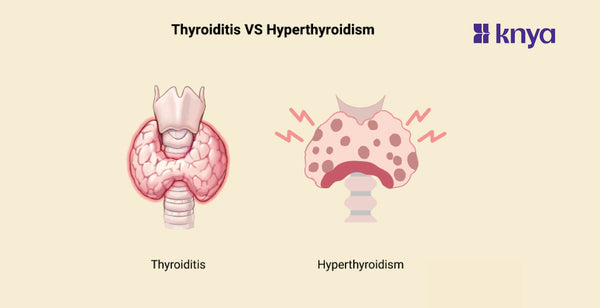Difference Between Thyroiditis and Hyperthyroidism: Thyroiditis and Hyperthyroidism are two separate thyroid-related disorders. Various types of inflammation, such as that brought on by infections or autoimmune illnesses, can cause thyroiditis, which manifests as symptoms like weariness and neck ache. Depending on the kind, it may cause either Hyperthyroidism or Hypothyroidism. On the other hand, Hyperthyroidism, which is frequently caused by diseases like Graves' disease or thyroid nodules, is characterized by an excessive synthesis of thyroid hormones. Nervousness, quick heartbeat, and weight loss are among the symptoms. Treatment methods vary and are based on the particular ailment and its symptoms, such as medicine, radioactive iodine therapy, or surgery.
Difference Between Thyroiditis and Hyperthyroidism
Thyroiditis is characterized by inflammation of the thyroid gland and can be brought on by infections or autoimmune disorders, among other things. Conversely, Hyperthyroidism, which is frequently linked to diseases like Graves' disease or thyroid nodules, is the overproduction of thyroid hormones. The table below provides the differences between Thyroiditis and Hyperthyroidism
|
Aspect |
Thyroiditis |
Hyperthyroidism |
|
Definition |
Inflammation of the thyroid gland. |
Excessive production of thyroid hormones. |
|
Cause |
Autoimmune diseases, infections, hormonal changes. |
Autoimmune disorders (e.g., Graves' disease), thyroid nodules. |
|
Symptoms |
Neck pain, thyroid tenderness, fatigue, weight changes. |
Weight loss, rapid heartbeat, sweating, nervousness. |
|
Thyroid Function |
Can lead to either hypothyroidism or hyperthyroidism. |
Characterized by an overactive thyroid gland. |
|
Treatment |
Depends on the type and symptoms, may include medication or hormone replacement therapy. |
Medications (antithyroid drugs), radioactive iodine therapy, or surgery (thyroidectomy). |
|
Common Types |
Hashimoto's thyroiditis, subacute thyroiditis, postpartum thyroiditis. |
Graves' disease, toxic multinodular goiter. |
|
Onset |
May be acute or chronic, depending on the type. |
Can develop gradually or suddenly. |
What is Thyroiditis?
Thyroiditis is an inflammatory condition affecting the thyroid gland that can be brought on by infections or autoimmune illnesses. It can result in Hypothyroidism or Hyperthyroidism, symptoms include weariness, neck pain, and changes in thyroid function. Treatment options include medication or other therapy, depending on the underlying reason and symptoms.
Causes of Thyroiditis
- Autoimmune Diseases: The immune system of the body targets the thyroid gland in autoimmune diseases such as Graves' disease and Hashimoto's Thyroiditis.
- Viral or Bacterial Infections: Viral infections, including the mumps and influenza, or bacterial infections can cause Subacute Thyroiditis.
- Postpartum Hormonal Changes: Following childbirth, changes in hormone levels might lead to postpartum Thyroiditis.
- Medication: Thyroiditis is a side effect of certain drugs, such as amiodarone and interferon.
- Radiation Therapy: After receiving radiation therapy to the head, neck, or chest, Thyroiditis may arise.
- Genetic Factors: People with specific genetic predispositions may be more prone to Thyroiditis.
Symptoms of Thyroiditis
- Neck Soreness or Discomfort: Tenderness or soreness at the front of the neck, especially when swallowing or contacting the thyroid gland.
- Fatigue: Experiencing extreme exhaustion or low vitality.
- Modifications to Thyroid Function: The conditions Hypothyroidism and Hyperthyroidism , which result from thyroiditis, can cause symptoms like:
- Hypothyroidism: Hypothyroidism causes weight gain, cold intolerance, constipation, dry skin, hair loss, and depression.
- Enlarged Thyroid Gland (Goiter): Thyroiditis can occasionally result in an enlarged thyroid gland, which can be felt or seen as a swelling in the neck.
- Other Symptoms: Mood swings, weakened muscles, joint discomfort, thinning hair, irregular menstruation, trouble sleeping, and so on may be present in addition to the above symptoms.
What is Hyperthyroidism?
Hyperthyroidism is defined by an overactive thyroid gland, which produces an excessive amount of thyroid hormones. The body's metabolism is accelerated by this hormonal imbalance, causing symptoms like heat intolerance, nervousness, weight loss, and a fast heartbeat. Thyroid nodules, thyroiditis, and autoimmune diseases such as Graves' disease are common causes. Depending on the underlying reason and specific conditions, treatment options include medication, radioactive iodine therapy, or thyroid surgery with the goal of normalizing hormone levels and relieving symptoms. In order to avoid complications and enhance the quality of life for those who are affected, early detection and management are essential.
Causes of Hyperthyroidism
- Graves' Disease: This autoimmune illness, which is the most frequent cause of hyperthyroidism, occurs when the thyroid gland is mistakenly attacked by the immune system, causing an excess of thyroid hormones to be produced.
- Thyroid Nodules: The thyroid gland occasionally develops nodules or lumps that have the ability to create extra thyroid hormone without regard to the body's regulating systems.
- Thyroiditis: When the thyroid gland becomes inflamed, usually as a result of autoimmune diseases or viral infections, thyroid hormones that have been stored in the body might momentarily leak into the bloodstream, resulting in Hyperthyroidism.
- Overdosage of Iodine: The thyroid gland may overproduce thyroid hormones as a result of eating or taking medications that contain an excessive amount of iodine.
- Overactive Thyroid Nodules: Hyperthyroidism can occasionally result from one or more of the thyroid gland's nodules becoming overactive and producing an excessive amount of thyroid hormone.
- Pituitary Adenoma: A benign tumor of the pituitary gland that produces excessive quantities of TSH, which causes the thyroid gland to create more thyroid hormones, is an uncommon cause of Hyperthyroidism.
Symptoms of Hyperthyroidism
- Fast Heartbeat (Tachycardia): A markedly elevated heart rate that is frequently accompanied by irregular heartbeats or palpitations.
- Unexplained Weight Loss: People with Hyperthyroidism may lose weight accidentally even when their hunger is enhanced.
- Anxiety and Irritability: There may be an increase in anxiety, restlessness, and irritability.
- Tremors: During fine motor tasks, there may be slight tremors in the hands and fingers.
- Heat Intolerance: inability to withstand heat, profuse perspiration, and heightened sensitivity to heated temperatures.
- Fatigue and Muscle Weakness: Despite having a higher metabolism, people may still feel fatigued and weak all over.
- Insomnia: Hyperthyroidism may manifest as insomnia, or trouble falling asleep.
- Changes to Bowel Habits: There may be a rise in the frequency of bowel motions, diarrhea, or loose stools.
Similarities between Thyroiditis and Hyperthyroidism
- Increased Thyroid Hormone Levels: Thyroxine, or T4, and triiodothyronine, or T3, are the thyroid hormones that are elevated in the bloodstream in both Thyroiditis and Hyperthyroidism. This results in signs of hyperactive thyroid hormones.
- Hyperthyroidism Symptoms: During the early stages of thyroiditis, the release of thyroid hormones that have been stored in the body might temporarily induce Hyperthyroidism. As a result, symptoms of Thyroiditis may resemble those of Primary Hyperthyroidism, including anxiety, weariness, heat sensitivity, rapid heartbeat, and weight loss.
- Enlargement of the Thyroid Gland: A goiter, or enlargement of the thyroid gland, can result from either of these disorders. Thyroiditis causes inflammation of the thyroid gland, which can cause swelling and pain and an obvious enlargement of the thyroid gland.
- Transient Nature: In the early stages of Thyroiditis, inflammation can trigger the release of thyroid hormones that have been retained in the gland, which can result in a brief case of Hyperthyroidism. Before the thyroid function returns to normal, there is usually a period of Hypothyroidism after this phase. The oscillating pattern of thyroid hormone levels has resemblance to the chronic Hyperthyroidism observed in primary Hyperthyroidism.
In conclusion, while the symptoms and hormonal effects of Thyroiditis and Hyperthyroidism are similar, the underlying causes, hormonal patterns, and therapeutic modalities are not. Hyperthyroidism is characterized by a persistent overproduction of thyroid hormones, while Thyroiditis is characterized by inflammation of the thyroid gland that results in varying amounts of thyroid hormones. Adequate diagnosis by medical practitioners is necessary to apply efficient treatment plans customized to the unique features of every ailment.
| Check out More Articles | |
| Difference Between Tendon and Ligament | |
| Difference Between Seizure and Epilepsy | |
| Difference Between Hypothyroidism and Hyperthyroidism | |















